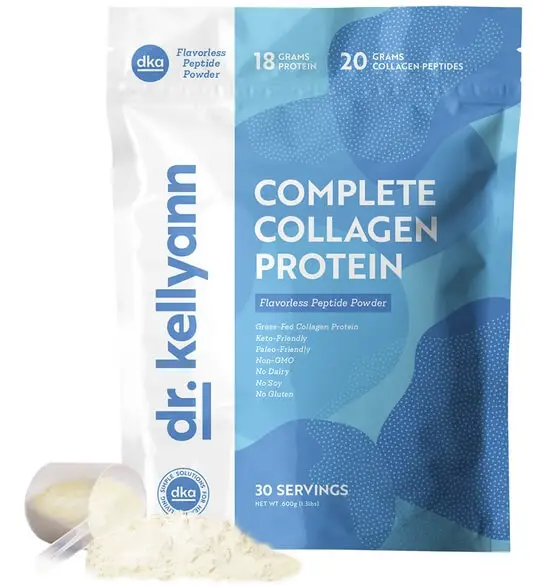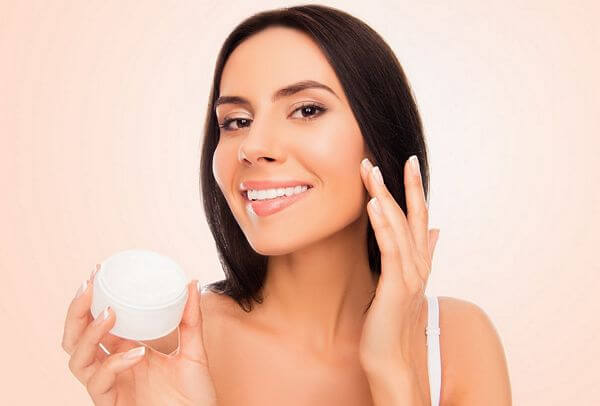Today I’m gonna talk all about collagen and skin care, collagen creams and then I’ll also talk about collagen supplements because there are a lot of questions about those.
When we think about skin aging, collagen comes to the forefront of our mind.

Build Your Collagen From Within! Click Here Now!
Collagen is 75% of the dry weight of the skin. As we get older, we make less collagen and our collagen in our skin starts to degrade more. That contributes to the formation of wrinkles and fine lines and sagging skin.
The other thing that degrades it substantially is exposure to ultraviolet radiation, specifically UVA, the part of the Sun that actually comes through the windows and that we are still exposed to while we’re indoors. It activates an enzyme in our skin called matrix metalloproteinase or a family of those enzymes that chew up collagen. Ultra violet radiation also slows down collagen production.

What exactly is collagen?
It is a complex structure that starts out as a chain, what are called amino acids, and those chains then get together and form coils. The coils then form what’s called a triple helix and then those triple helixes bind together at the end at their ends and then twist around and make this big structure called collagen.

It is a very massive structure.
So when it comes to collagen creams, it is very unlikely that putting that big molecule on the surface of your skin is going to enter your skin and get to the deeper layers where it needs to be.
That is very unlikely. That claim that collagen creams can improve wrinkles and fine lines has nothing to do with true long lasting collagen synthesis or collagen biology.
Where the magic happens with that large collagen molecule is at the surface of the skin. It holds on to water and that can plump up the top layer of the skin, the epidermis. It can plump up those skin cells and smooth out the surface of the skin.
But that’s temporary!
Once you stop using the collagen cream, your wrinkles will reappear. They don’t go away. They just become camouflaged by space-filling through that extra hydration.
Beyond just straight-up collagen creams, you also have creams that contain hydrolyzed collagen or collagen peptides.
These are basically digested bits of collagen. To give you an example, gelatin in jello is essentially hydrolyzed collagen. Just broken up into a few strands of amino acids.

Some research suggests that applying collagen peptides, these smaller fragments of hydrolyzed collagen, can perhaps traverse through the epidermis to the deeper layers of the skin where they might potentially serve as the substrates for collagen synthesis.
These cells in the deeper layer of the skin that make collagen are called fibroblasts. So maybe those collagen peptides, if they can get there, could serve as precursors for the fibroblasts to make more collagen.
That’s the plausible mechanism. It’s interesting and compelling, however it bears more research. We don’t have any actual data and people to back that up at all. It’s merely speculation at this point. It’s a huge leap in faith when it comes to the hydrolyzed collagen in skin care products.
However it’s not harmful to apply collagen or hydrolyzed collagen to the skin. And as I said, it can help add a little bit of hydration that can plump up the surface layers of the skin and smooth out the skin surface. That added hydration does help the skin barrier overall function.
So it’s definitely not a bad ingredient, but don’t be misled into thinking that collagen creams and hydrolyzed collagen creams are going to reverse aging or undo lost collagen or add more collagen into the skin.
Another reason you’ll see these things pop up in moisturizers so frequently is that for the manufacturer they add consistency to the product.
They’re added to the product as part of the vehicle, basically making the products something that you can actually scoop up and apply to your skin and have it on the skin comfortably and not ball up, pill up and be sticky and tacky. It kind of add viscosity and texture to the product, which is nice for the manufacturers and something they have to add anyways.
When it comes to collagen supplements, there is actually some evidence, a few studies, suggesting that taking collagen by mouth is associated with improved skin hydration, elasticity and skin smoothness.
The studies however are very small, around 60 participants, which is pretty small. They don’t look at a particularly long window of time, maybe 12 weeks, which really is not enough time to really understand what these are doing and if they are in fact yielding sustained benefit, beyond just drinking water.
The improved hydration and elasticity and skin smoothness that have been demonstrated in those studies maybe due to increased collagen production or it may just be due to something else, like drinking more water.
However, there is another way that we can use to find out if collagen supplements really work. User testimonials! For example, these collagen powder drinks have many positive reviews. People confirm that they work extremely well.
So take-home point about collagen creams is that their claims are gimmicky. But the ingredient collagen or hydrolyzed collagen is not a bad one to have in there. So if you’re using a product and you like it, go ahead and continue using it so long as it’s not causing problems for you.
Dietary supplements with collagen in them may improve the skin, according to small studies and user reviews.
The last point I want to make when it comes to improving wrinkles and fine lines, is that prevention is key. And the best way to do that is to protect your skin from ultraviolet radiation. This includes wearing broad-spectrum sunscreen every day and reapplying it at least three times a day because it rubs off.
Wear it even when you’re indoors. Like I said, a lot of UVA comes through the window and degrades the collagen in the deeper layers of our skin.
If you’re not wearing sunscreen every day, then why are you gonna be taking collagen in an effort to replace it?
This is a much better way to at least prevent it from further degrading. You can’t stop it entirely, it’s called life, it’s called chronology and time but protecting your skin from the Sun will protect from that and will also protect you from skin cancer formation and other skin problems.
